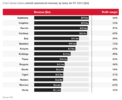1.) I’m not sure what losing games were expected to win has to do with being a big or small club. It says more about the players and coaching staff at that moment in time.
2.) I never said they get stronger when they’re winning. I said if you keep winning you’re more likely to be favourites in subsequent matches. It’s called a form guide.
3.) Do the top teams miss out on the finals because they dropped games close games?
4.) I never said we needed to be blown up. I’m saying judging a team by absolute number of wins is a useless metric. Everything comes down to how you are ranked relative the the rest of the competition in that year.
5.) Redlining is a thing.
6.) Do you think we could have played better or was that the best we could have done after the match in the tropics?
7.) It’s a baseless claim to say the Dragons fall from their premiership days is purely down to resources. As I previously showed even the Roosters and Broncos (who never lost access to their resources) had down periods when they made poor recruitment decisions.
8.) No your conclusion is demonstrably false. I’ve always said how you utilise your resources is what counts. The Broncos haven’t won a competition for 17 years now. Does that mean they’ve lacked resources since then?
ffs
1. And what about winning games we’re expected to lose? It happens every year, just like unexpected losses.
2. Form is just an indicator of how close the team is to its potential. It can also be skewed by facing a string of stronger/weaker opponents.
3. No they don’t. There’s why they’re the top teams. I’d say the top (and bottom) teams have fewer close games than the teams in the middle.
4. You at least have some control over your number of wins. You have zero control over how many wins other teams get other than when you face them.
5. So what is redlining, in your opinion?
6. Who knows. Maybe we redlined against Canberra and the Cowboys?
7. I think all three of those clubs suffered from back ended contracts. That’s a better explanation than them suddenly making poor recruitment decisions. Clubs (recruitment staff) and player managers know how good the players are and what they’re worth. The difference in ‘decision making’ comes down to the ability of some clubs to get players cheaper under the cap than others, and how much risk some clubs are forced to take to remain competitive against the stronger clubs. From there clubs can engineer premiership windows by front loading or back ending contracts to maximise player talent in a given set of years and paying for it later.
8. Number of premierships is a poor metric because it lacks granularity. Over a period as short as 17 years it is meaningless unless a club has won 2+ premierships in that time, in which case it shows an obvious advantage. But winning 0 or 1 premierships in 17 years tells us f**k all other than that a club isn’t dominant.
8a. As for the Broncos, they obviously have fewer resources than they did pre-2006, at least relative to the opposition. They were once the dominant club in the NSWRL/NRL. Now they’re not. You can put it down to the loss of Bennett but he has hardly won anything since 2006 either. But it’s fair to say the Broncos are on the rise while Wayne Bennett isn’t. I think it’s obvious they’ve had an injection of resources in the past five years. Remember when they were shit but still managed to keep all their stars? Very suspicious indeed.




